Mrs. Miniver Blu-ray Movie
HomeMrs. Miniver Blu-ray Movie 
Warner Bros. | 1942 | 134 min | Not rated | Jan 08, 2013
Movie rating
7.7 | / 10 |
Blu-ray rating
| Users | 5.0 | |
| Reviewer | 4.5 | |
| Overall | 4.5 |
Overview
Mrs. Miniver (1942)
The Minivers, an English "middle-class" family experience life in the first months of World War II. While dodging bombs, the Miniver's son courts Lady Beldon's granddaughter. A rose is named after Mrs. Miniver and entered in the competition against Lady Beldon's rose.
Starring: Greer Garson, Walter Pidgeon, Teresa Wright, Dame May Whitty, Reginald OwenDirector: William Wyler
| Drama | Uncertain |
| Romance | Uncertain |
| War | Uncertain |
Specifications
Video
Video codec: MPEG-4 AVC
Video resolution: 1080p
Aspect ratio: 1.37:1
Original aspect ratio: 1.37:1
Audio
English: DTS-HD Master Audio Mono (48kHz, 24-bit)
French: Dolby Digital Mono
Italian: Dolby Digital Mono
German: Dolby Digital Mono
Spanish: Dolby Digital Mono
Spanish: Dolby Digital Mono (Spain)
Subtitles
English SDH, French, German SDH, Italian SDH, Spanish, Korean
Discs
50GB Blu-ray Disc
Single disc (1 BD)
Playback
Region A, B (C untested)
Review
Rating summary
| Movie | 4.5 | |
| Video | 5.0 | |
| Audio | 3.0 | |
| Extras | 2.5 | |
| Overall | 4.5 |
Mrs. Miniver Blu-ray Movie Review
There'll Always Be an England
Reviewed by Michael Reuben January 13, 2013Legendary director William Wyler won the first of his three directing Oscars for this unabashedly patriotic celebration of the durability of ordinary British citizens facing the Nazi blitz. (The other two were for Ben Hur and The Best Years of Our Lives.) Like many of Hollywood's early pioneers, Wyler was an immigrant to America, a German Jew by birth whose name was originally spelled "Weiler". His interest in directing Mrs. Miniver stemmed from a profound conviction that his adopted land should not be sitting on the sidelines while Hitler's war machine pummeled the rest of Europe. Conceived in 1940, the film was intended to show the conflict as one affecting every man, woman and child, but by the time Mrs. Miniver reached theaters in June 1942, America had already entered the war. Still, Wyler's efforts did not go to waste. The rousing speech that closes the film was reprinted in Time and Life, broadcast on the Voice of America and printed on pamphlets dropped over Europe from Allied planes. Winston Churchill famously said that Mrs. Miniver did more for the war effort than a flotilla of destroyers. The source for the film was a series of English newspaper columns written for The Times of London by Jan Struther about a fictional English housewife. The columns were published in book form in 1939, but Wyler's film bore little resemblance to the book other than borrowing the title and a general notion of the title character. Four screenwriters labored to create a portrait of the Miniver family and their village as war casts its shadow over their lives. With the luminous Greer Garson in the title role and Wyler's notorious perfectionism applied to every aspect of the production, the result was an unforgettable portrait of how England fought the war in every corner of the homefront, as well as on the battlefields.
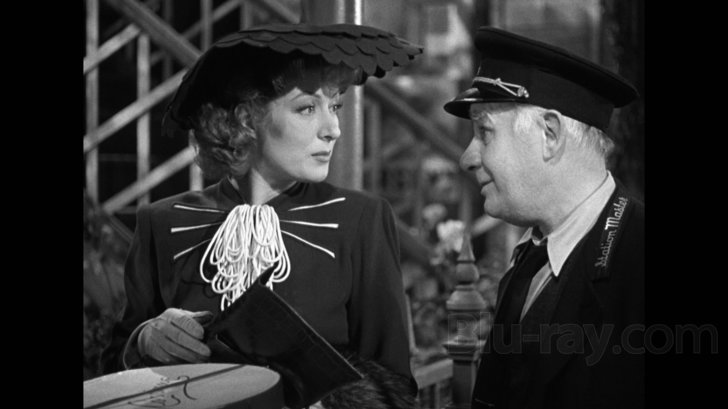
After a text crawl informing us of the year (1939) and the coming onslaught, Mrs. Miniver takes its time acquainting us with the members of the Miniver family, who live in the village of Belham on the Thames River within an easy train ride from London. Their house has no address, but is known simply by its name, Starlings. Clem Miniver (Walter Pidgeon) is a successful architect. His wife, Kay (Garson), has no greater worry than whether the new hat she bought during a shopping trip in London is too extravagant. Their younger children, Toby and Judy (Christopher Severn and Clare Sandars), are cheerful and energetic, and their older son, Vin (Richard Ney), is at Oxford. Two servants, Gladys the housemaid (Brenda Forbes) and Ada the cook (Marie De Becker), keep their home. Much of the film's pre-war section is occupied by the budding romance between Vin, who is home on a visit, and Carol Beldon (Teresa Wright), the granddaughter of Lady Beldon (Dame May Whitty), the local nobility. While their first meeting isn't propitious—he's full of radical ideas from the ivory tower, while she challenges him to do something other than talk—the attraction quickly blossoms. Lady Beldon disapproves and wants them to wait for marriage, but the declaration of war between England and Germany poses the tough question about whether anyone has the luxury of time. The extended scene in which Kay Miniver and Lady Beldon discuss their son's and granddaughter's future is remarkable for the clarity with which two such dissimilar women come to agree on the same priorities. As the war effort proceeds, the film bears witness to the transformation of the Minivers' daily lives. Air raid preparations are immediate, complete with a martinet of a warden, Foley (Reginald Owen), who's full of advice on what provisions to store in case of emergency and also happens to run a general store that supplies them. Vin Miniver joins the Royal Air Force and is rushed through training, because the RAF needs every pilot it can get. Clem Miniver is pressed into service, along with every other boat owner in town, to help evacuate the British forces from Dunkirk. The search for a German pilot who parachuted from his downed plane somewhere in the vicinity leads to a shocking discovery by Kay Miniver. Then there are the air raids. At first, London is the target, but then the area of bombardment expands. Refuge in the basement is no longer sufficient, and a shelter has to be built outside Starlings, where Wyler stages an impressively tense and claustrophobic sequence using only the sound of planes, ordnance and falling bombs and the frightened faces of Kay, Clem, Toby and Judy Miniver. A key subplot running throughout the film concerns a second "Mrs. Miniver", which is a new breed of rose created by the village's railway stationmaster, Mr. Ballard (Henry Travers, best known as the angel Clarence in It's a Wonderful Life). An amateur horticulturist, Mr. Ballard hopes to take first prize at the annual flower show sponsored by Lady Beldon, and he has named his rose after Kay Minniver as a token of appreciation for the interest she has taken in his efforts. Lady Beldon, of course, is scandalized, because she always wins best rose. The notion that a commoner could challenge her supremacy in her own contest . . . well, it just isn't done. As trivial as it may seem, the rivalry of the roses proves to be a useful distraction as grim events intrude. Determined not to yield in the face of the German threat, Lady Beldon proceeds with her flower show. It's a great success, even though an air raid cuts it short. When the village citizens emerge from their shelters, they gather in the local church to hear the vicar give the speech that would later be repeated throughout the U.S. and Europe. But they hear it in a church that no longer has a roof, and some of the people usually in attendance are no longer present.
Mrs. Miniver Blu-ray Movie, Video Quality 
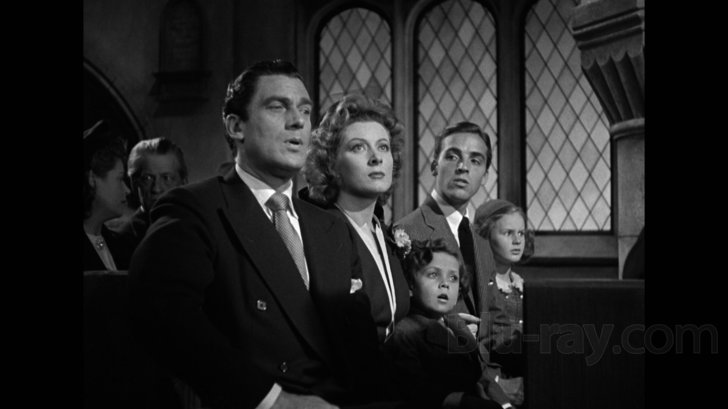
Mrs. Miniver was one of four Oscars awarded to Joseph Ruttenberg, one of old Hollywood's distinguished cinematographers and an acknowledged master of black-and-white images. (His other credits include Gaslight and The Philadelphia Story.) Warner's 1080p, AVC-encoded Blu-ray demonstrates yet again the studio's commitment to producing superior, film-like transfers for catalog titles from the golden age of the studio system. The source material is in excellent shape, and images are sharp and detailed without any evidence of artificial sharpening, grain reduction or other electronic manipulation. A very fine, natural grain pattern is discernible in the image, but one must be looking closely to see it. This is grain as it should be resolved on Blu-ray. Blacks are crisply, solidly black, and the various shades of gray are finely delineated, providing a sense of depth that is sometimes almost tactile. Contrast is never overstated, and I never once noticed any kind of artifact.
Mrs. Miniver Blu-ray Movie, Audio Quality 
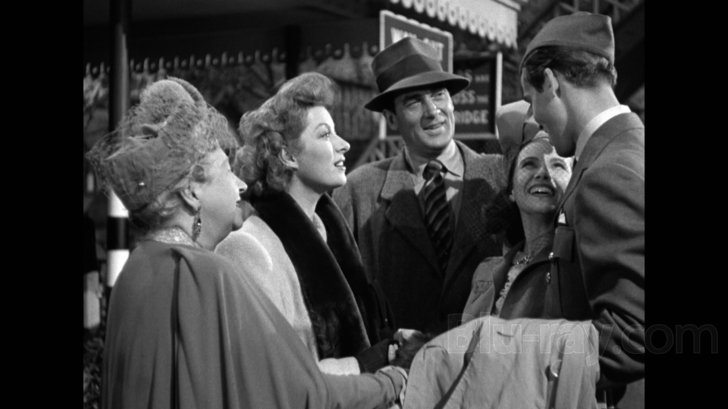
Mrs. Miniver's original mono soundtrack is presented as DTS-HD MA 1.0, and it is as good as the original source allows. Although the dynamic range is somewhat limited, the various sequences of aerial bombardment register with surprising power, as does a sequence involving several downed aircraft. Voices are clear, but some of the English regional accents were so thick that I had to consult the subtitles on occasion, which is unusual for me. The old-fashioned score by Herbert Stothart (The Yearling) might have better fidelity with a contemporary recording, but it could hardly sound more heartfelt.
Mrs. Miniver Blu-ray Movie, Special Features and Extras 
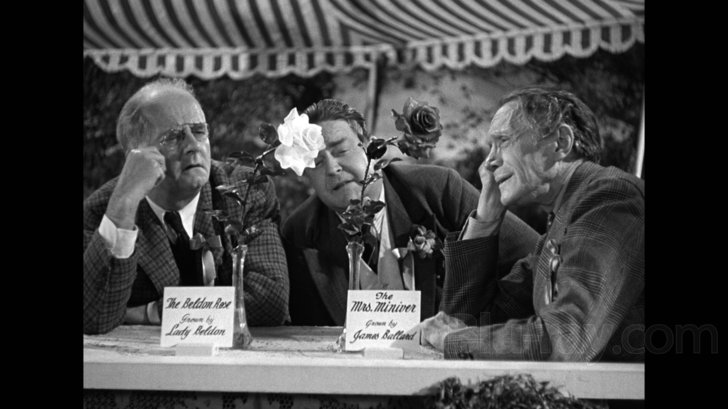
The Blu-ray includes most of the supplements from Warner's 2004 DVD (omitting only a photo gallery) and adds a new one (the Blitz Wolf cartoon).
- Mr. Blabbermouth! (480i; 1.33:1; 19:22): This satirical dramatization of an editorial from the Los Angeles Daily News aims to refute pervasive rumors that the U.S. navy was hopelessly crippled after the Japanese attack at Pearl Harbor. The opening cartoon with German, Japanese and Italian figures saying, respectively, "Heil", "Banzai" and "Viva Blabbermouth!", sums up the message.
- For the Common Defense (480i; 1.33:1; 21:36): This entry in MGM's "Crime Does Not Pay", series is intended to illustrate the value of international cooperation between police forces, in this case those of Chile and the U.S.
- Blitz Wolf (1080p; 1.33:1; 10:39): Tex Avery's retelling of "The Three Little Pigs", with the Big Bad Wolf reconceived as Hitler. The cartoon is preceded by a disclaimer regarding its ethnic and racial stereotypes. (Note: Despite the 1080p formatting, the quality of the source appears to be standard definition.)
- 1942 Academy Awards Newsreel (480i; 1.33:1; 0:58): This is an excerpt from Garson's best actress acceptance speech, which, at the time, set a record for length.
- Trailer (480i; 1.33:1; 2:42): Hokey, square and surprisingly effective.
Mrs. Miniver Blu-ray Movie, Overall Score and Recommendation 
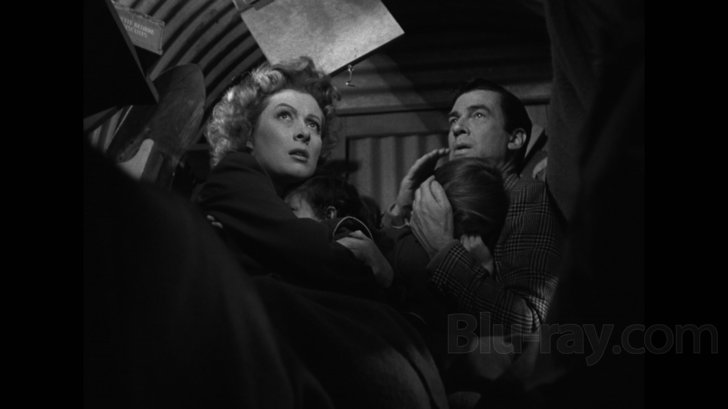
Walter Pidgeon may have been listed first in the credits, but Mrs. Miniver belongs to Greer Garson. Anyone could have played the character with traditional English reserve, but Garson did something much more difficult and essential to the film's impact. Her Mrs. Miniver remains unflappable, even when she's staring down the barrel of a German pistol, but she also brims with emotion that the camera can see passing across Garson's face, even if no one else around Mrs. Miniver happens to notice. (One gets the sense that Ballard, the stationmaster, notices, particularly during the scene when he encounters her by the riverbank, anxiously scanning the waters for her husband's boat.) To watch Kay Miniver stand firm for her family is to witness a special kind of patriotism, one that says almost nothing but simply gets on with doing what needs to be done. Churchill was right. Highly recommended.
Similar titles
Similar titles you might also like

Grand Hotel
1932

The Best Years of Our Lives
1946

Casablanca 4K
80th Anniversary Edition
1942

Mutiny on the Bounty
Warner Archive Collection
1935

A Streetcar Named Desire
Warner Archive Collection
1951

The Life and Death of Colonel Blimp
1943

The Edge of Love
2008

Atonement
2007

The Red Shoes 4K
1948

Wings
1927

Glorious 39
2009

Gigi
1958

My Beautiful Laundrette
1985

Ship of Fools
1965

Downton Abbey: The Complete Series
2010-2015

The Reader
2008

The Aftermath
2019

A Letter to Three Wives
Fox Studio Classics
1949

Diana
2013

Incendiary
2008